May 2022: Olive Tree

Volume VII/Issue 2/May 2022


From The Editorial Desk
What Is Our Life?
I’m sitting here at my desk, pondering God’s control of the future and our place as humans in the world. Spring is here, and the trees outside are gorgeous with breathtaking colors. However, before you know it, winter will be here, with bare trees and snow flurries.
The changing seasons outside reminds me of the seasons of our lives. When we are young and strong, we may think we are really going places; yet before we know it, our hair, like autumn leaves, is changing color, and soon winter comes and we pass out of this life. From a merely human point of view, this could be depressing.
Recently I came across the account in Mark 14:12–17 where Jesus sent two of His disciples to prepare a place for the Passover celebration. Even as Jesus was preparing them for some of the roughest times in their lives, his followers thought they were on the brink of an earthly victory. They wondered how soon Jesus would be on the throne. What government positions would each of them hold? Jesus was moving forward, and it was easy to follow Him.
Yet Jesus knew the hour was at hand when He would be killed and buried for three days. He knew people would soon give up all hope of seeing Him alive again. He knew His followers would forsake Him, and that Peter would deny he ever knew Him.
In that hour, the disciples could not imagine the resurrection, but Jesus knew all about it. In Mark 14:28, He told them “But after I have been raised up, I will go before you to Galilee.”
There are times in our lives when all we can see is the cold, bare trees; but the new life of the coming spring is as real as the present cold and darkness of winter.
Maybe you are feeling all alone. Maybe you have been forgotten by your family and friends. Maybe you feel misunderstood and misjudged. Maybe you feel like the last leaf on a bare tree, about to be blown away by the winter wind.
Jesus said, “Most assuredly, I say to you, unless a grain of wheat falls into the ground and dies, it remains alone; but if it dies, it produces much grain. He who loves his life will lose it, and he who hates his life in this world will keep it for eternal life” (John 12:24–25).
Many who look like losers now will win in the end. Open your eyes to the Lord’s promises, and experience the glory of Christ’s resurrection! If we live for Him, our life here is just a shadow of a better life to come.
Jesus said in John 14:1–3, “Let not your heart be troubled; you believe in God, believe also in Me. In My Father’s house are many mansions; if it were not so, I would have told you. I go to prepare a place for you. And if I go and prepare a place for you, I will come again and receive you to Myself; that where I am, there you may be also.”
Compared to spending eternity with Christ, this present life seems quite temporary. Living forever with the heavenly host in the presence of God sounds like real living to me.

White Martyrdom
In the December 2019 Olive Tree we read of Saint Eusebius of Vercelli: "He is therein referred to as a martyr, but the Breviary makes it clear that he was so by his sufferings and not by his death." Martyrdom is to suffer death in the defense of virtue. Other saints have also been styled martyrs, who did not suffer a bloody form of martyrdom. Saint Gregory the Great says: "all the saints have been martyrs either by the sword or of patience; so that, we can be martyrs without the sword, if we keep patience."
"I beseech you therefore, brethren, by the mercy of God, that you present your bodies a, living sacrifice, holy, pleasing unto God your reasonable service. And be not conformed to this world: but be reformed in the newness of your mind, that you may prove what is the good and the acceptable and the perfect will of God." (Romans 12:1-2) One of the essentials of the spirit of martyrdom is a spirit of self-sacrifice, which we considered in the October 2019 Olive Tree in the article on Patience. "Be you also as living stones built up, a spiritual house, a holy priesthood, to offer up spiritual sacrifices, acceptable to God by Jesus Christ." (I Peter 2:5)
Saint Thomas Aquinas tells us that martyrdom is to suffer death in defense of virtue. We are all familiar with the many martyrs, who shed their blood for Jesus. Saint Alphonsus wrote a book, Victories of the Martyrs, about some of these glorious martyrs.
There are three classes of people. The first are those who love and accept the truth and will give their lives for the truth, even if means martyrdom. These "follow the Lamb withersoever he goes." (Apocalypse 14:4) These are truly Christians, for Christianity is a way of life, which requires self-sacrifice and sometimes even the ultimate sacrifice. In fact, our lives are a martyrdom. Some by their self-denial earn the grace of a rapid martyrdom of blood, while most of us are called to the white martyrdom of patience and self-denial. However, one thing is certain, no one who is lax about the practice of Christianity can earn the great grace of martyrdom of blood. True, God grants this grace sometimes to catechumens and even to non-Catholics, who are thus baptized in their own blood. However, He never grants this grace to the lukewarm. (Apocalypse 3:16) He may grant us the grace to realize our lukewarmness and laxity and overcome it and become truly Christian, and then we might earn the grace of martyrdom, but never while we remain in lukewarmness.
The second class are hardened sinners, who need our prayers. The third class are the lukewarm, who need our prayers even more, because they think they are on the road to Purgatory, but most likely on the road to hell.
Father Faber says in Foot of the Cross: "Of all the interior dispositions of the saints, that which strikes us as the most magnificent, more magnificent than the spirit of martyrdom, is that of perseverance in a complete sacrifice." Most of the martyrs went through their sufferings rather quickly, although some classed as martyrs suffered for some time, such as Pope Marcellus. He was given a place to live. The emperor turned it into a zoo and made him tend it until he died from his sufferings. He is considered a martyr.
There are those who may suffer their whole lives. The enemies of God kill them by inches. Their whole life is a life of suffering in defense of virtue. Some people call these people white martyrs. When they are honored as saints, they are confessors, virgins or holy women, and white vestments are worn on their feast days. How many of the saints have been long suffering? How many of us are called to be long suffering as well.
Saint Bernard says: "The martyrdom of blood appears more cruel, but is less painful in duration than the martyrdom of chastity." Girardey continues in his Conference Matter for Religious on page 85: "It costs less to lose one’s life by a single blow, than to mortify our flesh all our life by purity." And Saint Jerome says: "Even amid peace we may with the sword of purity obtain the palm of martyrdom." And all of us are called to chastity. The married are called to chastity within their state of life, preserving themselves for each other. The rest of us are called to complete chastity.

Can You Walk in the Spirit and Be Depressed?
In other words can you walk in the Spirit and still face depression? Can you be angry and walk in the spirit? Can you be hurt by something someone has done to you and walk in the spirit? The answer is absolutely, YES. Walking in the spirit does not remove our feelings. Walking in the Spirit determines our reactions to our feelings. For example you can walk in the spirit and “be ye angry and sin not.” You can walk in the spirit and have your feelings hurt and sin not. You can walk in the spirit and be depressed and sin not. The sin is not the feeling. The sin is the wrong response to the feeling. Even suicidal feelings are not in and of themselves sinful, but the way you respond can be.
We beat ourselves up because we have these feelings. Therefore we try to deal with the feelings and never gain victory. That leads to a life lived in defeat and despair. The solution is to stop dealing with the feelings and start dealing with the response to the feelings. Okay, so you're angry. Respond to your anger in a way that is not sinful. Okay, so you've been deeply hurt by someone. Respond to the hurt in a way that is not sinful. Okay, so you are discouraged or maybe even facing deep dark depression. Don't beat yourself up. Instead, learn how to respond properly when you face these times of depression.
Walking in the spirit does not change the feelings we have. Walking in the Spirit changes the responses we have to the feelings. The Bible does not say walk in the spirit and you will not EXPERIENCE the lusts of the flesh. It says walk in the spirit and you will not FULFILL the lusts of the flesh. The flesh is the flesh. There is nothing we can do to change our flesh. However if we walk in the spirit we can respond to those feelings in a way that honors God. Stop beating people up for their feelings. Start encouraging them to respond properly to their feelings. Stop beating them up for being depressed. Encourage them to respond spiritually to their depression. If we could deal with the response to these normal feelings we could have victory in our lives.
Jesus was touched by the feelings of our infirmities because he knew we had these feelings. Jesus was tempted in all points like we are, yet he did not sin. We will sin. However we do not have to live in the defeat of that sin. If we walk in the spirit we can have victory when we have these feelings. The secret of the Christian life is not to deny the feelings. You will never accomplish that. You will get angry. You will get hurt by people. You will be disappointed by others. You will feel discouragement and maybe even deep depression. Walk in the spirit my friend, because if you do you will not fulfill the lust of the flesh when these feelings come.

My Vocation Story
However, out of respect for my parents, I stayed in Bulakan Bulakan. In 1984 September I and my brother became acolytes in our parish. Since I have a passion for apologetics, I found myself engaging in debates with my protestant classmates. That passion to defend the Catholic religion grew stronger so I decided to enter the seminary. That was in 1987 after I graduated from high school. I entered in Immaculate Conception major seminary.
My seminary life run smoothly from 1987- 1997. Though I experienced difficulties in Latin and College Algebra. It took me almost ten years because I took a regency period after second year in Theology to teach at Catholic School.
After graduation from Theology, I didn't submit myself for ordination to diaconate. I taught at Centro Escolar University. I got married to Lynn Jacinto and our union was blessed with one child. While teaching at the University, I enrolled in College of Law in year 2000 and graduated in 2004.
Nevertheless, my desire to serve as a priest still lingers. All the while I thought priesthood is not for me but in 2002 a former nun helped me to get in touch with Old Catholic priest that introduced me to his bishop, Bishop Joseph V. Galaroza of Brazilian Church. I was ordained deacon in December 7, 2002 and a priest in 2003. I served as assistant priest at Novaliches, Quezon City and subsequently in Sta. Mesa Manila.
By the grace of God, I was installed first parish priest at Our Lady of Fatima Parish Church in San Jose Del Monte, Bulacan in 2004. Seven years after, I was ordained a bishop by Archbishop Joel Clemente and Bishop Heyward Ewart in February 6, 2010 at St. Andrews Seminary in Quezon City.
Upon the retirement of Archbishop Joel Clemente as an Archbishop of Catholic Charismatic Church (CCC) due to health, I was then appointed Archbishop by the Patriarch Augustine I (John Walzer) in 2012.
Part of my episcopal agenda is to be reconciled with the Pope. Yet, my research lead me to sedevacantism i.e. the see of Peter is vacant due to heresy. Since October 9, 1958 the Vatican drifted apart from the Catholic Faith. In 2017, I issued a motu propio that Our congregation will embrace Tridentine Latin Mass and other traditional rites of the Catholic Church and Baltimore Catechism. We rejected the Novus Ordo Missae because it is protestant. In 2019 I learned about His Holiness Pope Michael and immediately contacted him. After several months of exchange of ideas, I made my profession of faith and His Holiness has received me into full communion with him and to the Catholic Church in 2020.
Archbishop Rogelio Martinez
 Why Isn't God Using Me?
Why Isn't God Using Me?
Have you asked yourself that question? For a long time I bemoaned the fact that God was not opening doors to me as though it were because He was holding my past against me like so many people have done. One day I realized that the reason God was not using me was because I had not yet become totally usable. At that moment I moved the responsibility for what I did with my life from others to myself. If I were to ever know God's perfect will, I had to first be in God's perfect will which meant that I had to present myself a living sacrifice, holy and acceptable unto God. At times we think that is instantaneous, but often it is gradual as we slowly learn the areas of our lives where we have not yet submitted.
I think that this is the place where many who have failed get stuck. They wait for the doors of opportunity to be opened and when they are not , they start to get frustrated and give up. I even began to get bitter at people for not giving me a chance to be used by God. When I realized my mistake, I quit waiting for man and started waiting on God. He will open doors greater than any man could open for me. The quickest way to put a limit on my future usefulness to God is to count on man to open my doors.
That does not mean that we should not submit to others to help restore us, but it does mean that we should not depend on them to make the future opportunities happen. God will use us when we become usable. My life will determine when and how much I am allowed to do for Him. The perfect will of God for my life is up to my willingness to submit myself to Him.

DeSantis Names Emma Weyant “Rightful Winner” of NCAA Five-Hundred-Yard Freestyle Over Trans Swimmer Lia Thomas
Florida Governor Ron DeSantis [March 22] issued a proclamation declaring Sarasota native and Olympic silver medalist Emma Weyant the “real winner” of the 500-yard freestyle event at the Women’s Swimming and Diving Championships....
Weyant, a freshman at the University of Virginia, finished second to Lia Thomas, a man who identifies as female and takes cross-sex hormones.
According to the university, Weyant finished the race with the third- fastest time in UVA history, as well as her own fastest career time. But Thomas beat her by 1.75 seconds, becoming the first transgender athlete to win an NCAA Division I title and the first man to do so in a women’s event....
“By allowing men to compete in women’s sports, the NCAA is destroying opportunities for women, making a mockery of its championships and perpetuating a fraud,” DeSantis said....
“In Florida, we reject these lies and recognize Sarasota’s Emma Weyant as the best women’s swimmer in the 500y freestyle.”
Muslim Family Members Attempt Murder on Christian Evangelist
A 34-year-old Christian evangelist’s Muslim family beat and tied him up to be burned alive after he returned home for his grandfather’s funeral in eastern Uganda, saying, “Allah will reward them in Jannah [garden paradise] if they kill” him....
...“My uncle accused me of embarrassing them by holding Christian evangelistic, open-air meetings and debates with Muslims,”
[Malingumu] Bruhan was quoted as saying [in Morning Star News]. “He accused me of being an infidel by converting to Christianity and that Allah will reward them in Jannah [garden paradise] if they kill me.”
The victim added, “He said to me that it is now the right time for me to receive punishment from Allah, whereby I was going to be burned alive and the birds of the air will enjoy me as their meat.”...
This was the 11th murder attempt on Bruhan, who had been ostracized by his relatives after his conversion in 2017.
Ugandan Pastor Slain by Muslims in Anti-Christian Attack
Islamic extremists in an eastern Uganda district accused a 58-year-old Christian pastor of being an “infidel, who had harmed the religion of Allah” for refusing to remove his church building. Wielding long knives and blunt objects, the men attacked the pastor in front of his daughter, who fled the scene to report the crime to police, according to reports. Three men dressed in Islamic attire killed Pastor Stephen Lugwire while he was in his animals’ grazing fields with his 23-year-old daughter....
...One yelled that Pastor Lugwire was a “kafir,” or infidel, who had harmed the religion of Allah....One of the men yelled...,saying, “...Today you will face the wrath from Allah.”
Woman Accused of Setting Fire to Houses of Worship Practiced Dark Magic, Friends Say
Former friends of a Connecticut woman who was charged with starting fires in a church and a Jewish synagogue on [March 11] said she recently went down a path worshiping the Devil and practicing dark magic....
The woman, 30-year-old Kimorah Parker, allegedly set fires at St. Matthew’s Lutheran Church and the Congregation Tephereth Israel 45 minutes apart in New Britain...police told WTNH....
WSFB spoke with two of Parker’s former friends who were in attendance in the courtroom...as she answered the charges....
Luis Malave, who said he has known Parker since she was 15, said that she has been practicing Santeria and witchcraft. Santeria is described as a syncretic, “Afro-Caribbean religion based on Yoruba beliefs and traditions, with some Roman Catholic elements.”
Citigroup Will Pay for Employees to Travel Out of State to Kill Their Babies in Abortions
Citigroup, one of the largest banks in the U.S., just announced a new incentive for its employees to prioritize their careers over family: travel money for abortions.
...The $1.7 trillion-dollar company is the fourth largest bank in the U.S., according to Bankrate.
...Citigroup plans to pay its employees’ travel costs to get abortions. This includes flight expenses, lodging and other travel expenses, Bloomberg reports....
The news comes after Apple announced a similar plan last fall.
Coptic Christian Brothers Murdered, Bodies Mutilated in “Revenge Killing” Over Seven Decades’ Old Dispute
Six Muslims in Egypt’s Minya Governate shot three Coptic Christian brothers, danced while murdering them and mutilated their bodies, claiming they were avenging the death of their own family member 70 years ago, according to a report....
The Muslims shot them and then severed and mutilated their bodies, dancing as they committed their crime, ICC [International Christian Concern] said, adding that Jaweer village from which they came also celebrated with musical instruments when they heard the news. When the attackers returned to their village saying “Allahu Akbar,” or “Allah is greater,” they were captured and arrested by the police. They later confessed their crimes and even demonstrated how they killed the Christian brothers.
They are now standing trial for the murders of the three Christian brothers, one of whom had six children.
Texas Abortion Ban Upheld by State Supreme Court
The Texas Supreme Court [mid-March] delivered a critical blow to abortion providers that sought to block the state’s controversial six-week abortion ban, known as the “Heartbeat Act,” that prohibits abortion procedures after fetal cardiac activity is detected. In a unanimous ruling...the top state court determined that abortion providers cannot sue state licensing officials in order to challenge the law since those officials do not have the ability to enforce the law, Axios reported....
The ruling effectively ends the abortion providers’ months-long federal lawsuit against the pro-life law, leaving it in place. The bold new law—which infuriated progressive lawmakers and abortion advocates in the state and across the country when it was approved last year—takes a unique approach to defend the lives of unborn babies. It leaves enforcement of the law up to private citizens who are empowered to sue anyone who performs an abortion after roughly six weeks’ gestation or “aids and abets” it....
The abortion ban, one of the strictest in the nation, will now remain in effect as the U.S. Supreme Court weighs the future of abortion in the country in general.
Economic Update
Two days after the last Olive Tree came out with the update on the fact that the US Dollar will soon not be the reserve currency, other news started coming in that indicates how much trouble the US economy is in. The government in the US reports an inflation rate of 8½%. A newsletter estimates that using the 1980's method of calculating the inflation rate, it would be 17%.
This inflation is finally having an effect. Dollar Tree, which is so named because everything is a dollar or less, has now raised prices to $1.25 or less. Other places will be making similar moves, raising prices.
There is a lot of talk now about an economic collapse. A website recently put us ten ways we can prepare for an economic collapse. The book, Return to Order is good, although we do not endorse the Society for the defense of Tradition, Family and Property, which promotes this website. However, following the advice of Saint Thomas Aquinas, we take and share truth and good wherever we find it.
People know that the collapse or some major change in economics will happen soon.

The Funny Pharmacy
A joyful mind maketh age flourishing: a sorrowful spirit drieth up the bones. - Proverbs 17:22
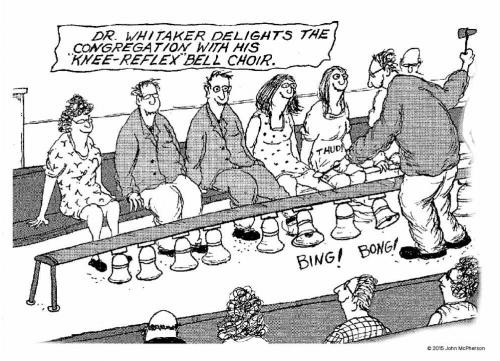


Frequently Asked Questions

Does God Appoint Evil Leaders to Lead Nations?
Romans 13:1 States That God Establishes All Governments
The key statement that we want to examine in Romans 13:1 is “no authority except from God, and those which exist are established by God.” There are two words of interest. The first is the word “authority” which in the Greek is exousia. It refers to anyone who has power or can exercise authority. In the context of Romans 13:1-7, it refers to governmental authority. The Greek word that is translated as “established” is tasso. This word appears eight times in the New Testament (Matthew 28:16; Luke 7:8; Acts 13:48; 15:2; 22:10; 28:23; Romans 13:1; 1 Corinthians 16:15). The word means “to appoint, to order, or to arrange”. That is, every governmental leader has been appointed, arranged or established by God.
Earlier in Romans 9:17, we are reminded that God put the Pharaoh of Egypt in his position of authority. We learn from Exodus 7-11 that this Pharaoh was an evil ruler. Romans 9:17 is a quote from Exodus 9:16-17, and it illustrates the principle of Romans 13:1.
In John 19:11 Jesus told Pontius Pilate, who was an evil governor, that his authority came from God the Father. In Daniel 4:17 the evil ruler of the Babylonian empire, King Nebuchadnezzar, reports part of a dream that God gave him.
In 1 Samuel 8 an amazing event is described that illustrates how God establishes or appoints rulers over nations. In 1 Samuel 8:1-7 we are told that the nation of Israel had rejected God as their king. Verse 7 summarizes Israel’s request.
Consequently, God allowed Israel to have their own king. Verses 10-18 record what God told Samuel to communicate to Israel that they would experience with their new king. The entire description is negative.
The message to Israel was simple. They would be allowed to select their ruler, but it was not the ruler God wanted for them. The ruler would be an evil one who would oppress them. Yet, God would establish his throne, but he would not be God’s choice.
Later in Hosea 13:9-11, God rebukes Israel for rejecting Him as their king. God says they had asked the judges for a king. The prophet Samuel was also a judge (1 Samuel 3:20; 7:15). They had asked for a king, and God gave them a king. In verse 11 God reveals that this was not His choice. Yet, God appointed him and established his throne.
King Saul proved to be an evil king. Most of the kings of the northern Kingdom of Israel and the southern Kingdom of Judah were evil kings. The people of Israel or the leaders of Israel selected their kings without consulting God. He allowed their choices. Yet, He granted these men the authority to rule as kings.
Israel rejected God as their king in 1 Samuel 8:1-18, yet God granted their choice. God repeatedly supported their horrible choices of subsequent kings.
Government exists and survives because God supports it. Yet when the rulers become too evil, God will judge them and punish them. Zechariah 1:15 tells us that God tolerates some evil from nations; but when they are excessively evil, God punishes them.
Romans 13:4 gives us the purpose of government and rulers. They were appointed by God to suppress evil or keep evil in check. When they fail to do this, it is time for judgment. God has not established human government to Christianize the world. The purpose of government is to suppress evil and maintain some semblance of justice and care for the oppressed (Isaiah 1:16-17). Isaiah 1:16-17 is not a Christian statement. It describes the rebuke of the nation of Israel. Amos 5:15 is another rebuke of the nation for failing to hate evil, love good and establish justice.
For answers to more frequently asked questions, click here: https://www.vaticaninexile.com/frequently_asked_questions.php
The Pope Speaks: May 2022
False Liturgy is the Result of Heresy

We hear much about Martin Luther saying: "Destroy the Mass And You Will Destroy the Church". However, let us look at how heresy proceeds to move forward. In 1517 Luther posted his 95 theses. His Missal did not come out until 1523. His aim was at doctrine first, then he formulated a new missal to fit his new doctrine. Over the centuries this liturgy has been revised.
England moved even more slowly. Henry VIII created the Anglican Church by separating from the Catholic Church in 1534. The book of common prayer was not begun until 1548 after Henry VIII had died. Thomas Cranmer, the Archbishop of Canterbury created this book to replace the Sarum Missal in use at the time of the creation of his Church. He did this in order to fit the liturgy of the Anglican Church with the doctrines of the time. Notice again that the heresy comes first, then the new liturgy.
Orthodoxy has not yet changed its liturgy, but has rejected the filioque doctrine. Saint Athanasius says: "The Holy Ghost is from the Father and the Son; not made, nor created, nor begotten, but proceeding." And we read in Scripture (John 15:26): "But when the Paraclete cometh, whom I will send you from the Father, the Spirit of truth, who proceedeth from the Father, he shall give testimony of me."
In the Conciliar Church things began with Vatican II (1962-1965). On December 4, 1963 the Decree Sacro Sanctum Concilium was approved. It states in paragraph 34: "The rites should be distinguished by a noble simplicity; they should be short, clear, and unencumbered by useless repetitions; they should be within the people's powers of comprehension, and normally should not require much explanation." Two paragraphs later after stating Latin is to be retained, it decrees: "But since the use of the mother tongue, whether in the Mass, the administration of the sacraments, or other parts of the liturgy, frequently may be of great advantage to the people, the limits of its employment may be extended. This will apply in the first place to the readings and directives, and to some of the prayers and chants, according to the regulations on this matter to be laid down separately in subsequent chapters." Much more could be said about this decree.
Vatican II teaches heresy in several of its decrees.
Pious ears are offended even before the Vatican 2 Council, when we read the following ruling of the Sacred Congregation of Rites dated February 14, 1961: "In preparing or revising the historical lessons of feasts of whatever class, the following should be observed: ... c/ the commonplace should be avoided; false 1 or inappropriate passages should be deleted or corrected; if historical data be entirely or almost entirely lacking, lessons from the Common should be assigned, or some other more appropriate text from the Fathers should be chosen."
Read this closely, and you will see that in 1961, this Congregation thought that it was possible for the Church to lie to us through the Sacred Liturgy! In his encyclical Mediator Dei Pope Pius XII condemns these errors most emphatically: "For this reason, whenever there was a question of defining a truth revealed by God, the Sovereign Pontiff and the Councils in their recourse to the 'theological sources', as they are called, have not seldom drawn many an argument from the sacred science of the Liturgy. For an example in point, Our Predecessor of immortal memory, Pius IX, so argued when he proclaimed the Immaculate Conception of the Virgin Mary. Similarly during the discussion of a doubtful or controversial truth, the Church and the Holy Fathers have not failed to look to the age-old and age-honored sacred rites for enlightenment. Hence the well-known and venerable maxim: 'Legem credendi lex statuit supplicandi'- let the rule for prayer determine the rule of belief. The sacred Liturgy, consequently, does not decide or determine independently and of itself what is of Catholic faith. More properly, since the Liturgy is also a profession of eternal truths, and subject, as such, to the Supreme Teaching Authority of the Church, it can supply proofs and testimony, quite clearly of no little value, towards the determination of a particular point of Christian doctrine."
In the Constitution on the Liturgy, Vatican 2 confirms the heresy quoted above: "As regards the readings, the following shall be observed: ... c/ The accounts of martyrdom or the lives of the saints are to accord with the facts of history. ... Historical truth should be attended not only in the lessons but also in the antiphons, hymns, and other parts of the Office, if there are any such proper parts; otherwise those parts should be taken from the common." Further it exacerbates this heresy by accusing the Church of teaching myths! "To whatever extent may seem desirable, the hymns are to be restored to their original form, and whatever smacks of mythology or ill accords with Christian piety is to be removed or changed."
And so this decree is heretical, but by no means the only heresy coming from Vatican II, which has more in common with the Jansenist Synod of Pistoia than with anything Catholic.
This decree began a movement in the liturgy, which came to be known as the changes, which ran from 1963 until the promulgation of the Novus Ordo in 1969 in the Apostolic Constitution, Missale Romanum. It states in part: "The recent Second Vatican Ecumenical Council, in promulgating the Constitution Sacrosanctum Concilium, established the basis for the general revision of the Roman Missal: in declaring "both texts and rites should be drawn up so that they express more clearly the holy things which they signify"; in ordering that "the rite of the Mass is to be revised in such a way that the intrinsic nature and purpose of its several parts, as also the connection between them, can be more clearly manifested, and that devout and active participation by the faithful can be more easily accomplished"; in prescribing that "the treasures of the Bible are to be opened up more lavishly, so that richer fare may be provided for the faithful at the table of God's Word"; in ordering, finally, that "a new rite for concelebration is to be drawn up and incorporated into the Pontifical and into the Roman Missal.""
Depending on where one lived, the movement of these changes. In the United States the whole Mass was in English by 1968. Patrick Henry Omlor questioned the validity of the New English Canon and wrote in part: "But the alteration we shall analyze most carefully is the one that occurs in the final words. For you and for all men so that sins may be forgiven has been substituted for: For you and for many unto the forgiveness of sins." He then concludes: "If the above substitution is not a mere translation, but involves an essential change in meaning, then the sacrament has clearly been rendered invalid, as shall be shown, using St. Thomas as an authority." We shall not go into an in depth study here. Many other vernaculars also made the same substantial change, including Italian. A priest went to Rome to question a Cardinal and asked: "What does Paul VI say, when he celebrates in Latin?" The answer was "pro multis", which means "for many." "And what does he say in Italian?" And he received the answer: "Per tutti," which means "for all." The priest told the Cardinal that until Paul VI figures it out, that he was going back to the Latin Mass, which expresses the Catholic Faith.
In the 1970's two questions were sent to Rome about this change and the reply was in essence that Jesus meant to say for all, but Aramaic did not have a clear word for this, so he used for many instead. There is much to consider here. Would God allow a language that cannot express His meaning clearly? The statement that God would create such a language sounds offensive to pious ears if not out right heretical.
Paul VI signed the decree, Insauratio Liturgia in 1974, which states: "The liturgical reform which has been carried out in accordance with the Constitution of the Second Vatican Council has made certain changes in the essential formulae of the sacramental rites." So if a essential form appears to be changed, then we must presume it has been changed to conform to Vatican II doctrine.
Let us return to the question of "for all" and "for many". Vatican II in encouraging religious liberty and other statements implies that all can arrive at Heaven or what is called Universal Salvation. "For all" fits with this doctrine better than "for many."
Although the translation has been changed back to the original as found in Scripture in most, if not all vernacular translations, does not change the fact that there is a problem. The form of consecration in the Conciliar Church, both Novus Ordo and Indult, must be interpreted in light of the two Notitiae. The new Rites of the Sacraments must be interpreted in light of Vatican II and its spirit, which they were formulated to express.
Those who desire to return to the Catholic Church must realize that restoring the Latin Mass is not going to restore the Faith to a heretical sect. The Faith must be restored with the liturgy. How are heretics received back into the Catholic Church? If they have their own liturgy, it must be restored to the form it had before their separation from the Church. For instance, if the Orthodox want to return, they must restore prayers for the Pope.
Return to the Church and the Church will restore the Mass and Sacraments to you.
1 Emphasis mine


St. Francis de Sales' Introduction to the Devout Life
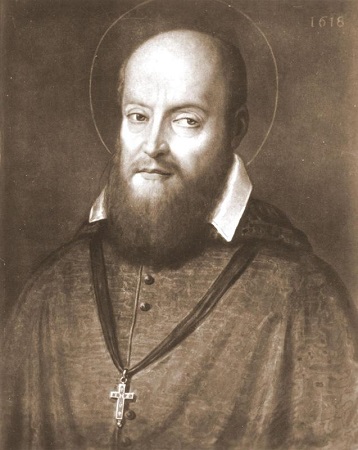
CHAPTER III
Devotion is suitable to every Vocation and Profession.
When God created the world He commanded each tree to bear fruit after its kind; and even so He bids Christians, the living trees of His Church, to bring forth fruits of devotion, each one according to his kind and vocation. A different exercise of devotion is required of each - the noble, the artisan, the servant, the prince, the maiden and the wife; and furthermore such practice must be modified according to the strength, the calling, and the duties of each individual. I ask you, my child, would it be fitting that a Bishop should seek to lead the solitary life of a Carthusian? And if the father of a family were as regardless in making provision for the future as a Capuchin, if the artisan spent the day in church like a Religious, if the Religious involved himself in all manner of business on his neighbour’s behalf as a Bishop is called upon to do, would not such a devotion be ridiculous, ill-regulated, and intolerable? Nevertheless such a mistake is often made, and the world, which cannot or will not discriminate between real devotion and the indiscretion of those who fancy themselves devout, grumbles and finds fault with devotion, which is really nowise concerned in these errors. No indeed, my child, the devotion which is true hinders nothing, but on the contrary it perfects everything; and that which runs counter to the rightful vocation of any one is, you may be sure, a spurious devotion. Aristotle says that the bee sucks honey from flowers without damaging them, leaving them as whole and fresh as it found them; but true devotion does better still, for it not only hinders no manner of vocation or duty, but, contrariwise, it adorns and beautifies all. Throw precious stones into honey, and each will grow more brilliant according to its several colour: and in like manner everybody fulfils his special calling better when subject to the influence of devotion: family duties are lighter, married love truer, service to our King more faithful, every kind of occupation more acceptable and better performed where that is the guide.
It is an error, nay more, a very heresy, to seek to banish the devout life from the soldier’s guardroom, the mechanic’s workshop, the prince’s court, or the domestic hearth. Of course a purely contemplative devotion, such as is specially proper to the religious and monastic life, cannot be practised in these outer vocations, but there are various other kinds of devotion well-suited to lead those whose calling is secular, along the paths of perfection. The Old Testament furnishes us examples in Abraham, Isaac and Jacob, David, Job, Tobias, Sarah, Rebecca and Judith; and in the New Testament we read of St. Joseph, Lydia and Crispus, who led a perfectly devout life in their trades: we have S. Anne, Martha, S. Monica, Aquila and Priscilla, as examples of household devotion, Cornelius, S. Sebastian, and S. Maurice among soldiers; Constantine, S. Helena, S. Louis, the Blessed Amadaeus, and S. Edward on the throne. And we even find instances of some who fell away in solitude, usually so helpful to perfection, some who had led a higher life in the world, which seems so antagonistic to it. S. Gregory dwells on how Lot, who had kept himself pure in the city, fell in his mountain solitude. Be sure that wheresoever our lot is cast we may and must aim at the perfect life.
Saints from East and West
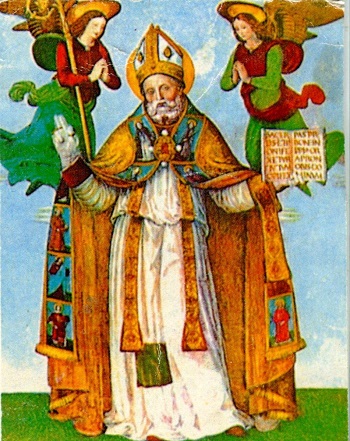
16 May - Saint Ubaldus.
We are fortunate in possessing an excellent and reliable biography of Ubald Baldassini, bishop of Gubbio, compiled by Theobald, his immediate successor. The saint, descended from a noble family in Gubbio, became an orphan at an early age and was educated by his uncle, also bishop of the same see, in the cathedral school. Having completed his studies, he was ordained priest and appointed dean of the cathedral, young though he was, that he might reform the canons amongst whom grave irregularities were rampant. The task was no easy one, but he succeeded before long in persuading three of the canons to join him in a common life. Then, that he might obtain experience in the management of a well-conducted household, he resided for three months with a community of regular canons which had been established by Peter de Honestis in the territory of Ravenna. The rule which they followed he brought back to Gubbio, and within a short time it was accepted by the whole chapter. A few years later, after their house and cloisters had been burnt down, Ubald thought it a favourable moment to retire from his post into some solitude. With this object in view he made his way to Fonte Avellano where he communicated his intention to Peter of Rimini. That great servant of God, however, regarded the plan as a dangerous temptation and exhorted him to return to the post in which God had placed him for the benefit of others. The saint accordingly returned to Gubbio, and rendered his chapter more flourishing than it had ever been before. In 1126 St Ubald was chosen bishop of Perugia; but he hid himself so that the deputies from that city could not find him; then he went to Rome, threw himself at the feet of Pope Honorius II and begged that he might be excused. His request was granted; but when, two years later, the see of Gubbio fell vacant, the pope himself directed that the clergy should elect Ubald.
In his new office the saint displayed all the virtues of a true successor to the apostles, but perhaps his most distinguishing characteristic was a mildness and patience which made him appear insensible to injuries and affronts. On one occasion workmen repairing the city wall encroached upon his vineyard and were injuring his vines. He gently drew their attention to this. Thereupon the foreman, who probably did not recognize him, became abusive and pushed him so roughly that he fell into a pool of liquid mortar. He rose up, splashed all over with lime and dirt, and without a word of expostulation returned to his house. Eyewitnesses, however, reported the incident and the citizens clamoured loudly that the foreman should be punished. So great was the popular indignation that a severe sentence seemed a foregone conclusion, when St Ubald appeared in court and claimed that, since the offence had been committed against an ecclesiastic, it came under his jurisdiction as bishop. Then, turning to the culprit, he bade him give him the kiss of peace in token of reconciliation, and, after a prayer that God would forgive him that and all his other trespasses, he directed that the man should be set at liberty.
The saint often defended his people in public dangers. The Emperor Frederick Barbarossa during his wars in Italy had sacked the city of Spoleto and threatened to subject Gubbio to a similar fate. Ubald met the emperor on the road and diverted the tyrant from his purpose. During the last two years of his life, the holy bishop suffered from a complication of painful diseases which he bore with heroic patience. On Easter day 1160, although very ill, he rose to celebrate Mass, and, that he might not disappoint his people, preached and gave them his blessing. He was carried back to bed, from which he never rose again. At Pentecost, as he lay dying, the whole population of Gubbio filed past his couch, anxious to take a last farewell of one whom each individual regarded as his dear father in God. Ubald died on May 16, 1160, and the people who flocked to his funeral from far and wide were eye-witnesses of the many miracles God performed at his tomb.
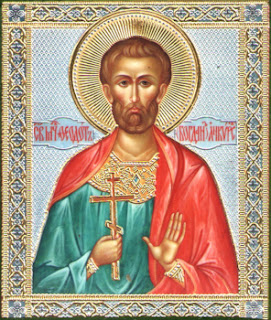
18 May - Saint Theodotus and the Holy Seven VIrgins of Ancyra.
The Holy Martyr Theodotus and the Holy Seven Virgins - Tecusa, Thaina, Claudia, Matrona, Julia, Alexandra, and Euphrasia, lived during the second half of the third century in the city of Ancyra, Galatia district, and died as martyrs for Christ at the beginning of the fourth century.
Saint Theodotus was an inn-keeper, had his own inn and was married. Then already he had attained to high spiritual accomplishment: he maintained prudence and purity, cultivated temperance in himself, subjugated the flesh to the spirit, and became practised in fasting and prayer. By his conversations he brought Jews and pagans to the Christian faith, and sinners to repentance and improvement. Saint Theodotus received the gift of healing from the Lord and he treated the sick by placing his hands on them.
During the time of the persecution under the emperor Diocletian (284-305), a certain Theoteknes, known for his cruelty, was appointed as governor in the city of Ancyra. Many Christians fled from the city, having forsaken their homes and property. Theoteknes made a proclamation to all Christians that they were under obligation to offer sacrifice to idols, and in the event of refusal they were to be given over to torture and death. Pagans delivered Christians over to torture, and then divided up their property.
A famine befell the country. During these grim days, Saint Theodotus gave shelter in his inn to Christians left homeless. He fed them, hid away those being pursued, and from his supplies gave to devastated churches everything necessary for making the Divine Liturgy. He fearlessly went into the prisons, rendering help to the innocently condemned, encouraging them to be faithful to Christ the Saviour to the very end. Theodotus did not fear to bury the remains of holy martyrs, either carrying them off secretly or ransoming them from the soldiers for money. When the Christian churches at Ancyra were destroyed and closed, Divine Liturgy began to be celebrated in his inn. Perceiving that the deed of martyrdom awaited him too, Saint Theodotus in conversation with the priest Phrontonos predicted that in a short while they would bring to him the relics of martyrs, at a place chosen by both of them. In surety of his words, Saint Theodotus gave his ring to the priest.
During this while, seven holy virgins had accepted death for Christ, of whom the eldest - Saint Tecusa - was an aunt of Saint Theodotus. The holy virgins - Tecusa, Thaina, Claudia, Matrona, Julia, Alexandra, and Euphrasia - from their youth had dedicated themselves to God, and lived in constant prayer, fasting, temperance, and good deeds. All of them had attained to an elderly age. Brought to trial as Christians, the holy virgins in front of Theoteknes bravely confessed their faith in Christ and were given over to torture, but remained steadfast. The governor thereupon gave them over to shameless youths for desecration. The holy virgins prayed intensely, asking help from God. Saint Tecusa fell down at the feet of a youth, and taking back her veil she showed him her greyed hair. The youths became startled, started weeping and ran off. The governor then ordered that the saints take part in "the ablution of the idols," which was done by pagan priests, but again the holy virgins refused. For this they were sentenced to death. A heavy stone was tied to the legs of each, and all seven of the holy virgins was drowned in a lake.
On the following night Saint Tecusa appeared in a dream to Saint Theodotus, asking him to take up her body and give it Christian burial. Saint Theodotus, taking with him his friend Polychronios and several other Christians, set off to the lake. It was dark, and a burning torch led the way. Amidst them in front of the guard, posted by the pagans at the shore of the lake, appeared the holy martyr Sosander. The frightened guard ran off in terror. The wind drove the water towards the other side of the lake. The Christians took up the bodies of the holy martyresses and carried them to church, whence they were given over to burial.
Learning about the theft of the bodies of the holy martyresses, the governor went into a rage and gave orders to strike at all Christians and give them over to torture. Polychronios also was seized. Not able to endure the torture, he informed on Saint Theodotus, as the perpetrator of the theft of the bodies. Saint Theodotus began to prepare to die for Christ; having come up together with all the Christians zealous in prayer, he made bequest of his body to the priest Phrontonos, to whom earlier he had given his ring. The saint came before the judge. They showed him various instruments of torture and instead of them they promised him honours and riches, if he recanted from Christ. Saint Theodotus glorified the Lord Jesus Christ, and confessed his faith in Him. In anger the pagans gave the saint over to constant torture, but the power of God sustained the holy martyr. He remained alive and was cast into prison. On the following morning the governor again gave orders to torture the saint, but he soon perceived that it was impossible to break his courage. He then gave orders to behead the martyr. The execution was done, but sensing that a storm was approaching, the soldiers set fire to the body of the martyr. And soldiers, sitting in a tent, remained to guard the body. At this point the priest Phrontonos appeared from a nearby way, leading a donkey with a load of wine from his vineyard. The donkey suddenly fell down near the place where lay the body of Saint Theodotus. The soldiers helped get the donkey back up and they told Phrontonos that they were guarding the body of the executed Christian Theodotus. The priest perceived that the Lord had intentionally sent him hither. He placed the holy remains on the donkey and took them to the place, indicated by Saint Theodotus for his burial, and with honour he committed them to the earth. Afterwards he built up a church on this spot. Saint Theodotus accepted death for Christ on 7 June 303 or 304, and his memory is commemorated on 18 May, on the day of death of the holy virgins.
The account of the life and martyr's act of Saint Theodotus and the suffering of the holy virgins was compiled by the contemporary and companion of Saint Theodotus, and an eye-witness of his death - Nilos, living in the city of Ancyra during the period of persecution of Christians under the emperor Diocletian.

Advice You Can Bank On
A Catholic Perspective On Finances
Avoiding Impulsivity
"Let no temptation take hold on you, but such as is human. And God is faithful, who will not suffer you to be tempted above that which you are able: but will make also with temptation issue, that you may be able to bear it." (1 Corinthians 10:13)
By design, grocery store checkouts, clothing store checkouts, and just about every checkout imaginable are made to tempt you into buying just a few more items before you leave with the items you came for. They’re usually inexpensive and some are truly interesting, and as you stand in line for your turn, you might contemplate and justify to yourself grabbing an item or two. They’re small, they’re cheap, and your bored, perhaps, and likely, there’s one employee at the register who’s responsible for checking out the entire store of shoppers. Another $5.00 purchase won’t affect your overall bill too greatly, right? Not exactly.
The actual data is staggering. According to some online shopping studies, impulse buying accounts for between 40% and 80% of purchases and is considered the norm! Almost half to almost ALL our purchases are out of impulsivity. A few years ago, the amount of money spent on impulse buys equated to about $5400 per year. If you’re a store owner, this is good news. Chances are, however, you’re a consumer like the rest of us, and this is a significant amount of money that could be going somewhere else instead.
God will not tempt us with things we cannot bear, as described in 1 Corinthians. There are quite a few ways to combat impulsivities in our regular purchases and we will cover a few of those in this month’s post.
Purchasing items can be triggered by our emotions. We’ve all heard the term “retail therapy”, and this is usually due to stress in our lives, or perhaps sadness, and the thinking that we need a “pick-me-up”. In fact, not that long ago the entire nation, and the world, came out of quarantine and went shopping. Titus 2:11-12 says, “For the grace of God our Saviour hath appeared to all men; Instructing us, that, denying ungodliness and worldly desires, we should live soberly, and justly, and godly in this world…”. Romans 12:3 points out, “For I say, by the grace that is given me, to all that are among you, not to be more wise than it behoveth to be wise, but to be wise unto sobriety, and according as God hath divided to every one the measure of faith.”
We are called to be sober, and while we could think of wine in this instance, this is calling us to be sober-minded. We should make decisions in a sober state, and not in one of exuberance, haste, or in sadness.
Impulse purchases do not have to be small items in the checkout that are easy to justify. Even though the top impulse buys happen at the grocery store, they can be large purchases as well. We wouldn’t typically think of a vehicle or a house as an impulse purchase, but they certainly can be. Fear can drive some to make a hasty purchase, especially if there is suspicion that the price may go up soon. You can refer to the recent housing market for examples of this, where median housing prices have increased about 16% year-over-year.
Using a “cool-off period” for these types of decisions can prevent many of the impulse buys we are trying to justify in the moment. Going out and test driving a car doesn’t need to lead to a purchase that same day. Once we have time to process why we may be shopping in the first place, we can usually figure out that we’re being impulsive, and instead direct our efforts toward what we already have. Investing an average monthly new car payment of $644 in a vehicle you already own would likely go a very long way.
Using cash for purchases is another way to ensure that you won’t overspend, no matter where or what you are shopping for. If you have a budget of $100 for the grocery store, and only bring cash, you are much more likely to stick to that as you’ve given yourself no other alternative. We already know from past articles that credit card and debit card spending lead to higher sales and over-spending versus cash spending.
Another tip to curb impulse spending is to unsubscribe from your email lists. This is nothing more than a fear tactic to get us to spend our hard-earned money in a flash. Your email is telling you that this fantastic, wonderful, once-yearly sale is only going to continue for another 12 hours, so you better hurry up and make your purchases. While you can use this to your advantage if the item you had been shopping for is now truly on sale, this is another way that retailers use our emotions against us. Be sober and watch: because your adversary the devil, as a roaring lion, goeth about seeking whom he may devour. (1 Peter 5:8)
In all things we should be grateful for what we have, and not what we don’t. Comparing ourselves to our neighbors or friends will lead to unhappiness as it’s a game we can never win. In all things give thanks; for this is the will of God in Christ Jesus concerning you all. 1 Thessalonians 5:18.

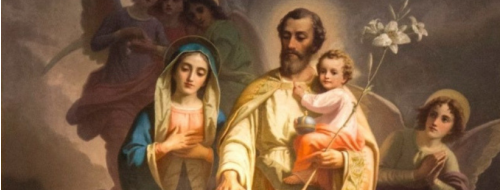 Family Matters
Family Matters
God's Plan For Children
All through the Scriptures we find a revelation of God's loving concern for the next generation. In many places we are commanded to pass on the lively torch of the faith to our children. The Bible is full of verses in which God promises miraculous aid to those parents who set themselves to follow this plan. One of the clearest portions of Scripture that deals with God's far-reaching plan for the generations is found in Psalm 78:1-7. read it aloud, with meaning, slowly and meditatively. I encourage you to read all portions of Scripture this way. You will get more out of them if you do. We tend to read the Bible the same way we take the rest of life here in America - in a rush.
Give ear, O my people, to my law: incline your ears to the words of my mouth. I will open my mouth in a parable: I will utter dark sayings of old: which we have heard and known, and our fathers have told us. We will not hide them from their children, shewing to the generation to come the praises of the Lord and his strength, and his wonderful works that he hath done. For he established a testimony in Jacob, and appointed a law in Israel, which he commanded our fathers, that they should make them known to their children: that the generation to come might know them, even the children which should be born; who should arise and declare them to their children: that they might set their hope in God, and not forget the works of God, but keep his commandments. Psalm 78:1-7.Before we study God's plan to propagate the faith to the next generation, I want to state the Catholic position on salvation for all of our children.
In order to understand the proper place of children in the Church, it is necessary to understand that the Church consists of those who have received the promise of spiritual blessing that was given to Abraham. The third chapter of Galatians spells this out carefully, concluding. “And if you be Christ's, then are you the seed of Abraham, heirs according to the promise” (Galatians 3:29).
The Abrahamic covenant (Genesis 12:1-3; 15:1-7; 17:1-14) was confirmed to his son Isaac (Genesis 26:1-5, 23-24) and his grandson Jacob (Genesis 28:10-15; cf. 48:15-16; 50:24). It continued with the nation of Israel (Exodus 2:24; 6:2-8), for whom the Law of Moses was added until the time of Christ (Galatians 3:17-19), in whom the promises given to Abraham were fulfilled (vss.16, 22-28).
After Abraham believed God and exercised faith in God's covenant promises, it was reputed to him unto justice (Genesis 15:6), the Lord added the rite of circumcision to the covenant arrangement, (Genesis 17:9-14). He received “the sign of circumcision, a seal of the justice of the faith which he [already] had, being uncircumcised. (Romans 4:11). Because Abraham was righteous (his sins were forgiven) as the result of his faith, he was circumcised as a sign given by God that sealed that righteousness. Physical, outward circumcision signified, inward cleansing of the heart, a spiritual reality for Abraham and all his true, believing descendants. “For he is not a Jew, that is one inwardly; and the the circumcision is that of the heart, in the spirit, not in the letter; whose praise is not of men, but of God.” (Romans 2:28-29) Also read Ezekiel 44:7.
Not only Abraham, but henceforth all males that were eight days old was to be circumcised among them. Throughout all generations (Genesis 17:12-13). Circumcision marked one's entrance into the covenant community; without it, “that soul shall be cut off from his people: because he hath broken my covenant.” (vs. 14).
This was God’s way of signifying that the promises given to faithful Abraham extended also to his children (and anyone else who came under and accepted his authority). Some of those, like his son Ishmael, left the covenant community and renounced the faith of Abraham. Others in Israel’s sordid history remained in the covenant community, but did not share the faith of Abraham. A remnant, however, by the grace of God, remained faithful.
A New Covenant Sign
Into the circumcised community was born Jesus, in whom the promise of the Spirit by faith for all peoples of the world, not just Jews, would come. (Galatians 3:8–9, 14). The line of physical descent from Abraham reached its climax in the person of Jesus (Galatians 16, 19). After him, only spiritual descent mattered (vss. 7–9, 25–26). Converts would no longer be incorporated into the nation of Israel.
Consequently, a covenant sign that focused on physical descent through the male line was no longer appropriate. A new sign of the covenant was needed—one that all people, whether Jew or Gentile, male or female, could receive. As we have seen, water baptism was instituted by Jesus as the new sign of entrance into the community of faith. Essentially, then, baptism replaced circumcision.
The change from circumcision to baptism is reflected in Acts 8:12, where we read that Samaritans were being baptized, “both men and women” There is no reason to point out that people of both genders were now receiving the sign of the covenant, except to contrast it with the old sign of the covenant. Implied in this contrast is the fact that baptism had replaced circumcision.
Spiritual Circumcision
There were Judaizers in the Church who wanted Gentile converts to be circumcised and to follow the whole Mosaic law. But in various epistles, Paul insisted that Christians not only had nothing to gain from circumcision and Judaism, but actually had everything to lose! Writing to the Colossians, he declared that Christians were complete in Christ and should not look to Judaism or any other religion to supplement their faith (Colossians 2:8–23). His statements specifically about circumcision and baptism, in verses 11–12, deserve close attention. In theses verses we read, “In whom also ye are circumcised with the circumcision made without hands, in putting off the body of the sins of the flesh by the circumcision of Christ: Buried with him in baptism, wherein also ye are risen with him through the faith of the operation of God, who hath raised him from the dead.”
Christians have no need for physical circumcision, Paul indicates, because “in Him”—that is, as part of their spiritual union with Christ—they have already been “circumcised with a circumcision made without hands” (vs. 11). That is, they have already received that inward circumcision, that spiritual cleansing of the heart, that is effected by the Holy Spirit. In Romans 2:28–29, Paul refers to this as inward circumcision, “of the heart, in the spirit, not in the letter.”
This circumcision of Christ, Paul continues, consists of “putting off, disposing of the body of the sins of the flesh” (Colossians 2:11). But what is “the body of the flesh”? An important textual variant here reads “power of your sinful self.”(ESV) or “your selfish desires.” (CEV) In either case, another contrast with circumcision is in view. Physical circumcision removes a small piece of flesh. But spiritual circumcision, removes or puts off the whole body of sinful flesh, that is, “our old man”, (our old self), “that the body of sin (the desires of the old self or the old man) may be destroyed”. When the Spirit cleanses the heart, the whole weight of sin is removed, and the sinful flesh is renounced so that we “would no longer be the slaves of sin.” (Romans 6:6).
This spiritual cleansing, Paul continues, is effected in “the circumcision of Christ” (Colossians 2:11). Since this verse has all along been speaking of the spiritual experience of the sinner, “the circumcision of Christ” must likewise be something in Christian experience, not something in the life of Jesus (as some suppose). It is the spiritual circumcising that belongs to Christ—“the circumcision done by Christ” or simply “Christian circumcision.” The Judaizers were insisting on the physical circumcision set forth in the Law of Moses; Paul was upholding the spiritual circumcision of Christ.
Paul’s opponents might well have agreed that an inward cleansing was in order. However, they would have insisted that this be signified by physical circumcision. But Paul indicates that that is not necessary, for the Christian has already been “buried with Him” [that is, Christ] in baptism (Colossians 2:12; cf. Romans 6:4–5). Physical circumcision has nothing to add.
A new sign, baptism, has been received.
Finally, Christians have been “raised to life because they had faith in the power of God, who raised Christ from death” (Colossians 2:12). “For we are buried together with him by baptism into death, that as Christ is risen from the dead...so we also may walk in newness of life.” (Romans 6:4). What do the Judaizers have to offer in comparison with that? We are already complete we are already full in Christ (Colossians 2:10)!
It is part of the teaching of Colossians 2:11–12, then, that baptism has replaced circumcision for the covenant community. The Abrahamic covenant is fulfilled in the new covenant, and circumcision has been replaced by baptism as the sign and seal of the righteousness of faith.
Children in the Church
Under the Abrahamic covenant, those who were born within the covenant community received the sign of the covenant as infants. Because the Abrahamic covenant remains in effect, but with the sign of it having been changed, it follows that those who are born within the covenant community should be baptized as infants, just as they were formerly circumcised as infants. They should be baptized at the start of the discipling process, as outlined by Jesus.
If there are any doubts as to the “fitness” of infants to be raised as disciples of Jesus, he himself dispelled them. When children were brought to Jesus by their parents for his blessing, the disciples tried to brush them aside (Mark 10:13–16). But Jesus said, “Suffer the little children to come unto me, and forbid them not; for of such is the kingdom of God” These children included “infants” (Luke 18:15); Jesus “took them up in His arms and laying his hands upon them, he blessed them” (Mark 10:16).
Some would say that Jesus welcomed them just to teach adults a lesson (see Luke 18:17). But if infants do not qualify for the kingdom of God, then how can adults qualify by being like them? There is no lesson for adults to learn unless Jesus welcomes the infants of believers into his kingdom. That kingdom, today, is essentially the Church, the body of Christ, with Jesus as the head, ruling, with a Pope being his representative of authority here on earth (Matthew 16:18–19). Since people are visibly received into the church by baptism, it follows that infants are to be received into the kingdom of God by baptism.
Faith and Baptism
As we have seen, circumcision under the Abrahamic covenant was applied to infants on the basis of parental faith (Genesis 17; Romans 4:11). Since we today are part of that covenant through faith in Christ, the new sign of the covenant, water baptism, should likewise be applied to infants on the basis of parental faith.
That theological conclusion is confirmed by the accounts in the book of Acts which reveal that whole households were commonly baptized on the basis of the faith of the head of the household.
The most detailed and informative account for this conclusion is that of the Philippian jailer (Acts 16:30–34). “Believe in the Lord Jesus,” he was told, “and thou shalt be saved, and thy house.” (vs. 31; cf. 11:14). Accordingly, the gospel was preached “to him and to all that were in his house.” (vs. 32). In response, he “believing God with all his house.” (vs. 34), whereupon “was baptized, and all his house immediately.” (vs. 33).
The key word in this passage is “with.” (vs 34) It signifies accompaniment.
When Luke says that the jailer heard the gospel and believed with his household, the implication is that everyone in his household went along with him. Any older household members, such as his wife, evidently became believers, too. But any young children went along with their father, following his lead with whatever limited understanding that they had.
This crucial distinction between “with” and “and” is clear in similar passages in Acts: 1:14; 3:4; 4:27; 5:1; 10:2; 14:13; 15:22; 21:5. In each case, “with” introduces those who follow the lead of others and join with them in their activity, however actively or passively. In Acts 21:5, for example, Paul is escorted to the harbor by all the men in the church at Tyre, “with wives and children,” which no doubt included a number of small infants.
In the household baptism passages, the head of the house always believes “with” his household, but he and they are baptized. Just as the heads of households escorted Paul to the harbor “with” infants who were only passive participants, so also heads of households were baptized “with” whatever infants were in their families.
Some would argue that there may not have been any infants in these households mentioned in Acts. However, household baptism was evidently a common practice in the apostolic church (see also 1 Corinthians 1:16). It must have happened thousands of times, often including infants.
You and Your Children
Paul’s promise to the Philippian jailer, that salvation would come to his whole house if he believed in Jesus, was no different from what Peter told three thousand adult converts at Pentecost. The promise of the Holy Spirit , Peter said, was “to you, and to your children, and to all that are far off, whomsoever the Lord our God shall call.” (Acts 2:39).
These converts had just been called by the Lord into fellowship with himself, and many other adults (them that are "far off”) would be called in the future, but the children of these converts formed a third category: they were called into fellowship with Christ together with their parents (or even merely one parent: see 1 Corinthians 7:14). Such is the grace of God to the children of believers! We can only infer that the children of the first Christian converts were baptized, brought up in the Christian faith (see Ephesians 6:1–4; Colossians 3:20–21), and, at some point were confirmed.
Conclusion
When we look carefully at the teaching of Scripture, we see that the sign of the covenant was applied to infants prior to Christ, and presumably continued to be applied to them when Jesus changed it to baptism. And when we look closely at the household baptisms described in Acts, there can be little doubt but that infants were commonly baptized in the apostolic church. They were baptized then, and they should be baptized now, on the basis of God’s promise to bless the children of believers. The faith of a parent qualifies a child to be baptized and raised as a disciple of Jesus. He welcomed them into his kingdom, and so should we.
Now in saying all that, I feel it is very foolish for those who are parents, to start resting on the baptism of their children, while neglecting the propagation of the faith, as we have read in Psalms 78. I think we act foolishly, if we have the mentality that says, “My children are baptized in the Church, so there good to go.” We are talking about preserving a godly seed upon the earth. Yes, it is true; the graces and the transformation of baptism can do a mighty work in them. However, we will save them so much pain and heartache if we follow the directives laid out in these verses from the time they are very young.


Books to feed your faith!
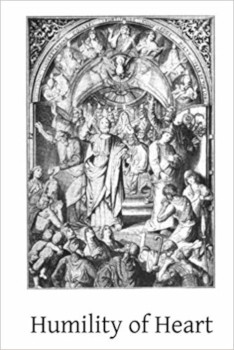
Humility of Heart
$4.95
To his own soul Cardinal Vaughan found so much benefit from the cultivation in it of Humility, that he resolved, at no small cost to himself, in the feeble state in which he then was, to gird himself and to go forth sowing broadcast, into the soil of the hearts of the laity as well as of clergy, this despised little mustard seed of which men speak so much but know so little. It was Padre Gaetano's work on Humility that had been the instrument, in God's hand, of helping the Cardinal. Accordingly in his zeal for souls he proposed to put it into English, so as to bring the work within the reach of all such as care for the health, growth and strength, of their own individual souls in solid virtue. That the Cardinal has left us a precious legacy in this treatise on Humility will, I feel sure, be the verdict of all who study, or who only peruse these pages, done into English from the Italian of the devout Minor Capuchin whose death occurred over two centuries ago. Between the covers of this unpretending volume there is nourishment for all who "hunger and thirst after justice"-----for the proficient in spiritual life as well as for the beginner-----Humility, as it were, holding in itself all those elements that are needed to build up the strong Christian man. In it the soul will find a sovereign remedy for its many ills, a matchless balm for its many wounds, while a soul-beauty all is own will spring up in all who shall learn how to use it wisely under the guidance of the Holy Spirit." He who is truly humble," says St. Bernard, "knows how to convert all his humiliations into humility," while out of humility God can raise a soul to what otherwise might be, giddy heights of sanctity. If anyone should need a proof of this statement I will refer him to any chapter in the life of any Saint in our Calendar. For a moment gaze into the face of "the Woman clothed with the Sun" and remember the words, "Respexit humilitatem ancillae suae." The height of Mary's sanctity is gauged by the depth of her humility: "Exaltavit humiles." To the Clergy and Ladies of Charity, to whom the Cardinal dedicates these "Thoughts and Sentiments," this volume will come with very special meaning. It enshrines the last words of a great Churchman, of a truly spiritual man, while it conveys a special message from the Cardinal's heart to all readers. This treatise is a sort of last will and testament of Cardinal Vaughan, bequeathed to those with whom he was most intimately associated in work for the good of souls. It is a legacy from one who made Humility a life-long study, and who had more opportunities than most of us know of making tremendous strides in it, through the humiliations which he welcomed as most precious opportunities offered him by God for the salvation and sanctification of his soul. May he rest in peace.
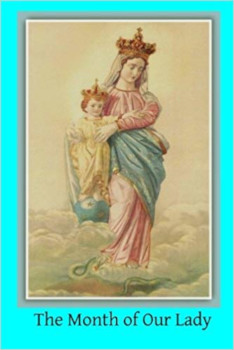
The Month of Our Lady
$17.95
DEVOTION to our Blessed Lady has been so long established among the faithful and is so universally known and practised, that any explanation on my part is unnecessary and superfluous. The compiler and translator has been induced to think that he would render a service to religion, and at the same time pay a tribute of devotion to the Mother of God, by presenting this old work in a new English dress. That this little book may promote and foster among the faithful deep and heartfelt devotion to the Blessed Virgin Mary. As a woman was instrumental in the fall of man, it was the will of God that a woman should co-operate in man's redemption. During forty centuries the Lord, in the language of Isaias, observed attentively the illustrious women who from time to time appeared, in order to choose her who should be most worthy of himself and best adapted to the plan of the redemption of man. Sara presented herself in the splendor of her wealth, Rebecca in the lustre of her beauty, and Rachel in the elegance of her grace; but their wealth, beauty, and grace had no attractions for the Most High. Ruth, Jahel and Judith, Abigail and Esther, appeared in succession; but none of these was chosen. They were all figures of that exalted maiden in whom the virtues and worth of each and all of them were to be united. Who then will be that illustrious woman foretold by the prophets, longed for by the patriarchs, foreshown from the earliest days in symbols and figures so numerous and so various, and promised by the Almighty from the beginning? ,Lovely daughter of JoachiIn and Anne, thou art the chosen one! Although many maidens have arrayed themselves in garments of glory, Mary far surpasses them in abundance of merit and fulness and richness of reward. Mary, as well in the order of nature as in the order of grace and glory, far excels all women, all just souls, and even all angelic beings united; for she alone attracted the especial preference of Almighty God, and was selected by him to be the mother of his Son, and thus to cooperate in our redemption. Wishing to consecrate to the honor of Our Lady the month of May, we shall commence our exercises of piety by considering the principal motives which urge us, as Christians, to pay to her the tribute of our devotion. The first is because amongst all created beings she is adorned with transcendent sanctity, the second because she is the mother of God and also our mother.
Will the Real Catholic Church Stand Up?
Kindle $2.99 / Paperback $9.95
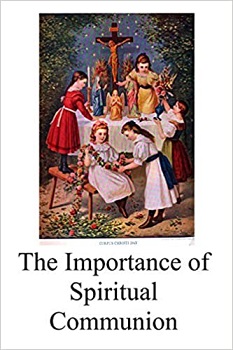
The Importance of Spiritual Communion
Kindle $2.99 / Paperback $5.99
If we cannot receive Holy Communion actually, then let us do so spiritually. These prayers and instructions have been gathered from the Saints and other venerated spiritual writers. Spiritual Communion has been a part of the spiritual life for decades. Growing up I was instructed to make a Spiritual Communion, when I could not go to Communion such as when I assisted at a second Mass. The same is true if one finds oneself at Mass, but not fasting. There are times coming, when it will be difficult, if not impossible to assist at the Holy Sacrifice of the Mass. We should be prepared for such times.
For More Good Traditional Catholic Books:

Crust-less Spinach & Cheese Egg Pie

Ingredients
1 tablespoon vegetable oil
1 onion, chopped
1 (10 ounce) package frozen chopped spinach, thawed and drained
5 eggs, beaten
3 cups shredded Muenster cheese
¼ teaspoon salt
⅛ teaspoon ground black pepper
Directions
1. Preheat oven to 350 degrees F (175 degrees C). Lightly grease a 9 inch pie pan.
2. Heat oil in a large skillet over medium-high heat. Add onions and cook, stirring occasionally, until onions are soft. Stir in spinach and continue cooking until excess moisture has evaporated.
3. In a large bowl, combine eggs, cheese, salt and pepper. Add spinach mixture and stir to blend. Scoop into prepared pie pan.
4. Bake in preheated oven until eggs have set, about 30 minutes. Let cool for 10 minutes before serving.
Lemon Icebox Pie
Ingredients
1 (9 inch) prepared graham cracker crust
2 (8 ounce) packages cream cheese, softened
1 (14 ounce) can sweetened condensed milk
2 lemons, juiced
1 teaspoon lemon zest
Directions
1. In a medium mixing bowl, beat cream cheese until fluffy.
2. Add condensed milk, lemon juice, and lemon rind. Mix until smooth.
3. Pour mixture into crust.
4. Refrigerate at least 2 hours before serving.
Garnish with whipped cream and mint leaves if desired.
Video sermons and instructions: Timeless timely truths for living the Faith
Receiving The Word: Second Sunday after Easter
3rd Sunday After Easter Aliens In The World
Fifth Sunday after Easter, 2013.
Deo Gratias

Encouragement for Today
Therefore encourage one another and build one another up.... I Thessalonians 5:11
We believe that through our assorted podcasts, Vlogs, audio downloads and devotional blogs, you will find an assorted Treasure Chest of...
- Sermons
- Classic Catholic Audio Books.
- Devotionals
- Scripture Studies
- Catechism Lessons
- Old-Time Christian radio programs
- Catholic Videos
...that will be a help in your faithful walk with the Lord.
LEARN MORE AT THE ENCOURAGEMENT FOR TODAY WEBSITE: https://www.encouragementfortoday.com
Truths From Genesis 1:1

God Had No Beginning.
The Bible tells us that time, space, and matter (the universe) had a beginning, but that God was just there! How could this be? If God made time, then God had to exist before time. We know that time can be measured. For instance, we measure time with our watches by measuring minutes or hours. Each time we have a birthday, we know that a whole year of time has passed by. As time goes on, we get older-every thing that exists gets older. But if God made time and exists outside of time, then He does not age.
Maybe why we find this hard (really impossible) to completely understand is because we were created just as time was created. The one who created us must understand much more than us. We can't understand everything about God, but God helps us to understand as much as we can.
Look in the Bible at Exodus 3:14. God had spoken to Moses and told him to go to the great Pharaoh of the Egyptians, and tell him to let God's people, the Israelites who were slaves, go free.
Moses wanted to know who he should say sent him to do this. In verse 14 we read, God said to Moses, “I AM WHO I AM” And he said, “say this to the people of Israel: 'I AM HAS SENT ME TO YOU.'”
God said his name was “I AM”. Now that might sound like a strange name, but do we know what this means? We were born (had a beginning), which is why we existed in the past and we exist now, and we will continue to exist in our body until we die. Of course, the real us does not cease to exist when we die. If we are a Christian, the Bible teaches us that we will leave our body and go to be with God forever-now that is something to look forward to. We were born, are existing now, and will be existing forever, either with God or sadly, apart from God, if we have not committed our life to Him. We had a beginning.
However, God exists! He did not have a beginning. He is just always there. He doesn't age, because with God there is not time. He made time so that He could make us. That is why He says His name is “I AM.” Now in Psalms 90:2 we read, Before the mountains were brought forth, or ever you had formed the earth and the world, from everlasting to everlasting you are God. God exists in eternity-He didn't have a beginning.
Catechism Catch-Up
Confirmation-The Seven Fold Grace of God pt 2: Counsel

In the Catechism of the Council of Trent we read:
Quote “In Confirmation is contained the true and proper nature of a Sacrament has always been acknowledged by the Catholic Church.” the Catechism goes on to say, “The truth of this doctrine St. Clement could not confirm in stronger terms than when he says, 'All should hasten without delay to be born again (baptized) unto God, and afterwards to be signed (confirmed) by the Bishop.” that is to receive the seven fold grace of the Holy Ghost; for, as has been handed down to us from St. Peter, and as the other Apostles taught in obedience to the command of Our Lord, he who culpably and voluntarily, and not from necessity, neglects to receive this Sacrament, cannot possibly be a perfect Christian.' To be a perfect and complete Christian one needs to be sealed at the day of their confirmation with the seven fold grace of the Holy Ghost.”
What is the seven fold grace of the Holy Ghost? And what is it used for in our Christian life?
The seven fold grace of the Holy Spirit that, initially, is magnified in us at our confirmation, and has unique skills and abilities given by the Holy Spirit, to faithful followers of Christ, to serve God for the common benefit of his people, the Church. And for reaching others, out side of the Church, for Christ. The seven fold grace, referred to by the Catechism, is described in Isaiah 11:1-3, where it mentions wisdom, understanding, counsel, fortitude, knowledge, and Piety and the fear of the Lord. The seven fold grace of the Spirit, mentioned in Isaiah, are simply God empowering faithful Christians to do what He has called us to do. The Catholic Church list them as:
- Wisdom
- Understanding
- Counsel
- Fortitude
- Knowledge
- Piety -Godliness
- Fear of the Lord
In our last lesson we discussed Wisdom, Understanding and Knowledge. And we said, that simply put, these gifts, as they are called in the Bible, are defined as:
- Knowledge – the facts.
- Understanding – ability to translate meaning from the facts .
- Wisdom – knowing what to do next, given an understanding of the facts and circumstances.
Now Concerning the grace of Counsel: The Hebrew word for counsel is defined, as- To give advice or deliberate opinion to another. To exhort, warn, admonish, or instruct. To recommend.
Understand that everyone is given the seven fold graces at our baptism. But what our confirmation does is enhance certain ones in our lives and it is different for everyone. Romans 12:4-8, says “For as in one body we have many members, but all the members have not the same office: So we being many, are one body in Christ, and every one members one of another. And having different gifts, according to the grace that is given us....” One of those gifts or graces that is mentioned is exhortation, which in Isaiah 11:1-3 otherwise uses the word counsel. What is interesting is that the Greek word for pä-rä'-klā-sēs which is translated exhortation, exhorting, or exorteth, is the same word that Jesus uses when He tells his disciples that “I will ask the Father, and he shall give you another Comforter/Paraclete, an Exhorter, a Counselor that he may abide with you for ever.”
To be able to counsel is a Characteristic of the Holy Ghost and is one of the seven-fold gifts or graces given to each and everyone of us at our baptism, and then enhanced in many that are confirmed.
Let me give you some general characteristics that are typically exhibited by those who have the grace of counseling.
General Characteristics
A counselors' central motivational drive is to encourage believers to mature in Christ and to grow spiritually. Counselors' often seek to stimulate that development by disciplining, teaching, and exhorting others.
- A counselor regards God’s sovereignty as his “favorite” characteristic of God.
- Counselors regard trials as opportunities for growth. Since God is in control, they recognize that whatever happens, has potential to glorify God and conform believers to the image of Jesus Christ. The counselor sympathizes with the suffering Christian, but he sees the pain through the lens of God’s sovereignty rather than through the lens of suffering. (A person with the gift of mercy, on the other hand, would see the pain through the lens of suffering.)
- Counselors express love through availability.
- Given a choice of helping someone “spiritually” or helping him with a physical need (such as taking a meal to him or mowing his lawn while he’s in the hospital), the Counselor prefers to offer spiritual help. Given a choice of encouraging by empathy or encouraging by counseling, a person with this gift of the seven fold grace will counsel every time.
- Wise counsel flows from the heart of the counselor who can identify precepts and principles in God’s Word skillfully.
- Counselors love to encourage, encourage, encourage!
- Counselors and mercy-givers make a good team for counseling someone who is discouraged. The person with the gift of mercy empathizes—he knows how the downhearted person feels. The counselor exhorts—he knows how the person needs to feel! The counselor’s job is to give hope by sharing a Catholic perspective on the situation and reminding people of God’s power, love, and faithfulness. A counselor avoids weeping with others (as the mercy-giver would weep) because he sees empathy as encouragement to wallow in self-pity. The counselor wants to “move on” past the pain and take advantage of the opportunity to become more Christlike.
- A counselor responds to problems by prescribing specific steps of action; His goal is to make the plan so easy to comprehend that people will understand it, see its potential, embrace it, and grow as a result of carrying it out.
Now Lets Look At A Counselors Strengths
- A counselor uses Scripture, the Church Fathers, and Tradition to validate the experience.
- Counselors are willing and eager to come alongside a brother or sister in Christ during difficult circumstances.
- Memorization of, and meditation on, Scripture are usually very important to the counselor, because he wants to be able to draw wisdom from the well of truth stored in his spirit.
- A counselor sees every little detail, including the timing of every event, as part of God’s good and loving plan.
- Because a counselor sees trials in a positive light, which is opposite of the world’s way of seeing them, a counselor continually reminds people of God’s sovereignty and love.
- Counselors focus on balance; they avoid extremes, especially in doctrine.
- A Counselor seems to be able to give thanks in all seasons and circumstances, including the darkest ones.
- Counselors understand that time reading and time studying the Word of God brings more than information; it brings transformation.
Now Let Us Look At A Counselors Weaknesses
- Counselors tend to need visible evidence of acceptance and affirmation.
- They can easily oversimplify solutions, which ultimately results in discouragement rather than encouragement.
- Surprisingly, Counselors can be poor listeners, even though they make excellent counselors. Sometimes they are so intent on telling you how to view your situation from God’s perspective that they fail to listen to your viewpoint.
- Mature counselors give wise counsel from the Word of God. Therefore, their counsel usually proves to be effective. Unfortunately, their success often tempts counselors to promote principles as formulas, and the formulas as cure-alls.
- Counselors are often naïve and easily manipulated.
- Because a counselor wants so badly for Scripture to provide a successful step of action to eliminate a problem, he may quote Scripture out of context or imply that it says something that it doesn’t mean, rationalizing that the end justifies the means. This is a devastating trap for the counselor.
To keep the weaknesses of the Counselor from affecting his or her gift we must do two things. One, Depend on the one who gave us the grace of Counseling. Depend on the Paraclete - the Holy Ghost, to guide and direct your gift. Always remember that your gift is part of a seven-fold grace given to others in the body of Christ. There must be a balance of those gifts. And that balance happens when we as the Church with diversity of gifts, work together in unity and love for each other.
READ MORE FROM THE TRADITIONAL CATECHISM AT THE WEBSITE: https://www.traditionalcatechism.com
Living Catholic:
What Is Iniquity?

Iniquity is the inner act of willfulness against God. It involves the attitudes of the heart. Scripture specifically identifies the following iniquities: bitterness (see Acts 8:23), greed (see Acts 8:18–23), lust (Job 31:1–12), and stubbornness (I Samuel 15:23).
The Greek word for iniquity that is used most frequently in the New Testament is anŏmia, which means “illegality, i.e. violation of the law or . . . wickedness.” It stems from the word anŏmŏs, which refers to not being subject to the law. Based on the teaching of Jesus and other passages of Scripture, iniquity is doing our own will instead of God’s will, even if our own will appears to be “doing good.”
Jesus said: “Not every one that saith to me, Lord, Lord, shall enter into the kingdom of heaven: but he that doth the will of my Father who is in heaven, he shall enter into the kingdom of heaven. Many will say to me in that day: Lord, Lord, have not we prophesied in thy name, and cast out devils in thy name, and done many miracles in thy name? And then will I profess unto them, I never knew you: depart from me, you that work iniquity.” (Matthew 7:21–23).
The definition of iniquity as “doing our own will” is confirmed in Isaiah 53:6: “All we like sheep have gone astray, every one hath turned aside into his own way: and the Lord hath laid on him the iniquity of us all.”
Psalm 119:1–3 declares that when we walk in God’s ways, we do no iniquity: “Blessed are the undefiled in the way, who walk in the law of the Lord. Blessed are they who search his testimonies: that seek him with their whole heart. For they that work iniquity, have not walked in his ways.”
To Learn More Principles For Life Go To: Resources: Principles of Life

Enjoying the Olive Tree? Why not subscribe today? Click here to go to the FREE scubscription page!


Pray for the Holy Father! Pray with the Holy Father!
- Your prayers are asked this month and every month for the intentions of the Holy Father, Pope Michael.
- Please pray for the success and growth of the new Chrysostom Bible Institute. Check out the wonderful work it is doing and see how you can get involved!
- Your prayers and support are asked in a special way for the soon to be established House of Prayer.
- Pray especially that the Holy Ghost inspires and helps us prepare spiritual manuals and days of recollection to make available to all.
- Keep in your prayers our Podcast Ministry, a new way to reach out in the missionary work of the Church! We ask for prayers for our other activities world wide. We have made good contacts in the Philippines and Japan and ask prayers that these contacts will bear much fruit for the salvation of souls.
- Be sure to keep St. Helen Catholic Mission in your prayers. Why not go on over to the site now and see what they have to offer and how you might be able to help!
- Also we ask you to keep in prayer our increasing missionary work in the United States and elsewhere.
- Pray for those outside the Church and those who do not know God, that they may see the light of grace and be led safely home to the refuge of the Holy Catholic Church.
- As always, we also ask that you pray for yourself! Never forget your own state of soul. God is calling you to His service in His love. We know that our Lord can count on you to answer.
- We are all praying especially for you, too. May you correspond with every grace of God!
- In what other needs or intentions may we pray for you? Let us know!
- Let us remember that the Church runs on prayer. Without your prayers, God will not work in hearts and souls to bring them to a knowledge of the truth. (I Timothy 2:4)


To Donate online go to:

To Donate by Mail:
Our address is
Vatican in Exile
829 NE Chester
Topeka, Kansas 66616
Make Checks payable to:
Vatican in Exile


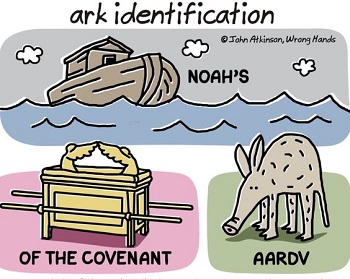
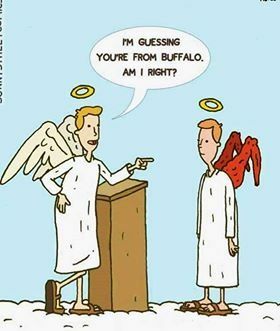
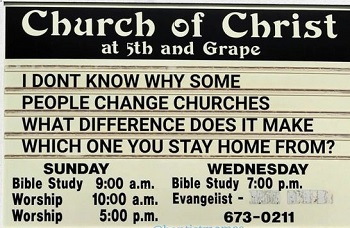
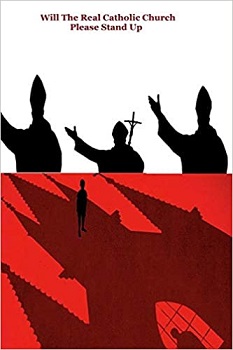










 Follow
Follow


